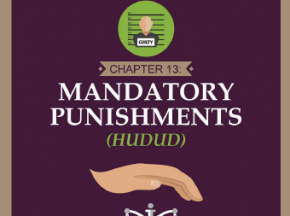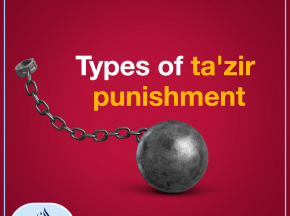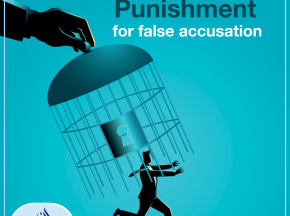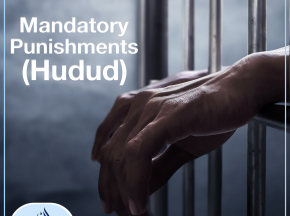content of level
Mandatory Punishments.
Mandatory Punishments.
Mandatory Punishments (Hudud)
The Arabic term hadd (plural: hudud) is defined as a punishment stated in Islamic law for encroaching on the limits set by Allah. It is also defined as a punishment stated in Islamic law, as a deterrent from committing a similar offence.
Drinking intoxicants
It tackles the ruling on drinking intoxicants in Islam, it is unanimously agreed that it is forbidden. The reason, punishment and conditions are discussed in detail.
Punishment for false accusation
The prescribed punishment for false accusation of adultery is severe for reasons such as: protecting society, safeguarding honors and putting an end to evil talk and indecency.
The crime of false accusation of adultery
Accusing an innocent person with adultery or any immoral acts is strictly forbidden by God by clear statements. All Muslim scholars agree that it is a cardinal crime; due to the harm caused to the person and society.
The mandatory punishment for adultery
To enforce the punishment for adultery, it must first be proven to have occurred. The proof required is either four confessions by the doer, or the testimony of four witnesses.
Ruling on Adultery
Zina stands for both fornication and adultery, which are cardinal sins. Islamically, it refers to sexual intercourse between man and woman with no legitimate marital relationship.
Mandatory Punishments (Hudud)
Hudud are punishments for encroaching on the limits set by God, their legitimacy is based on the Quran, Sunnah and unanimity of scholars such as adultery and theft punishments.
Types of ta'zir punishment
Ta'zir punishments may be classified as follows:
Enforcement
Punishment are of two types. The first is to neglect or omit duties when one is able to fulfil them, such as the repayment of debts, delivering things held in trust to their rightful owners, safeguarding the property of orphans and delivering these when the orphans come of age. Any of these may be punished by Ta'zir until the person concerned does his duty.
Discretionary punishments
Ta'zir refers to ‘punishment for any act of disobedience to Allah which does not carry a mandatory punishment or require a particular recompense.’
Theft
Theft is forbidden because it is an aggression on other people’s rights and taking their property unlawfully.
The punishment for drinking intoxicants
The punishment for drinking intoxicants is 40 lashes, but it may be increased to 80 if the Muslim ruler determines that such an increase is needed to make the punishment a more effective deterrent.
Punishment for false accusation
Allah has determined that the punishment for anyone who accuses a Muslim of adultery, without providing the necessary proof, is 80 lashes. Furthermore, the accuser is considered a fasiq, i.e. ‘transgressor’ and he is totally disqualified as a witness in any case whatsoever. This shows how grave this sin is…
The crime of false accusation of adultery
It is absolutely forbidden to accuse anyone of immoral and lewd action. Allah says: ‘Those who accuse chaste women who may have been unthinkingly careless but remained true believers, shall be rejected by Allah in this world as well as in the life to come. They shall endure awesome suffering’ (24: 23).
Proof of Adultery
Before the punishment for adultery is enforced, the crime must first be proven to have occurred.
The mandatory punishment for Adultery
An adulterer can be either a muhsan or non-muhsan. The mandatory punishment for a muhsan is different than that of a non-muhsan.
Adultery
Zina stands for both fornication and adultery; it refers to sexual intercourse between man and woman when there is no legitimate marital relationship, real or imagined, between them.
Mandatory Punishments (Hudud)
The Arabic term hadd (plural: hudud) is defined as a punishment stated in Islamic law for encroaching on the limits set by Allah. The hudud aim to deter people from committing acts of disobedience of Allah. Thus, they help to spread security and reassurance in the community.
Learn Fiqh with Al-Hakeem | Mandatory Punishments
In this Lecture, Sh. Assim Al-Hakeem discusses and explains the Mandatory Punishments (Hudud).




















